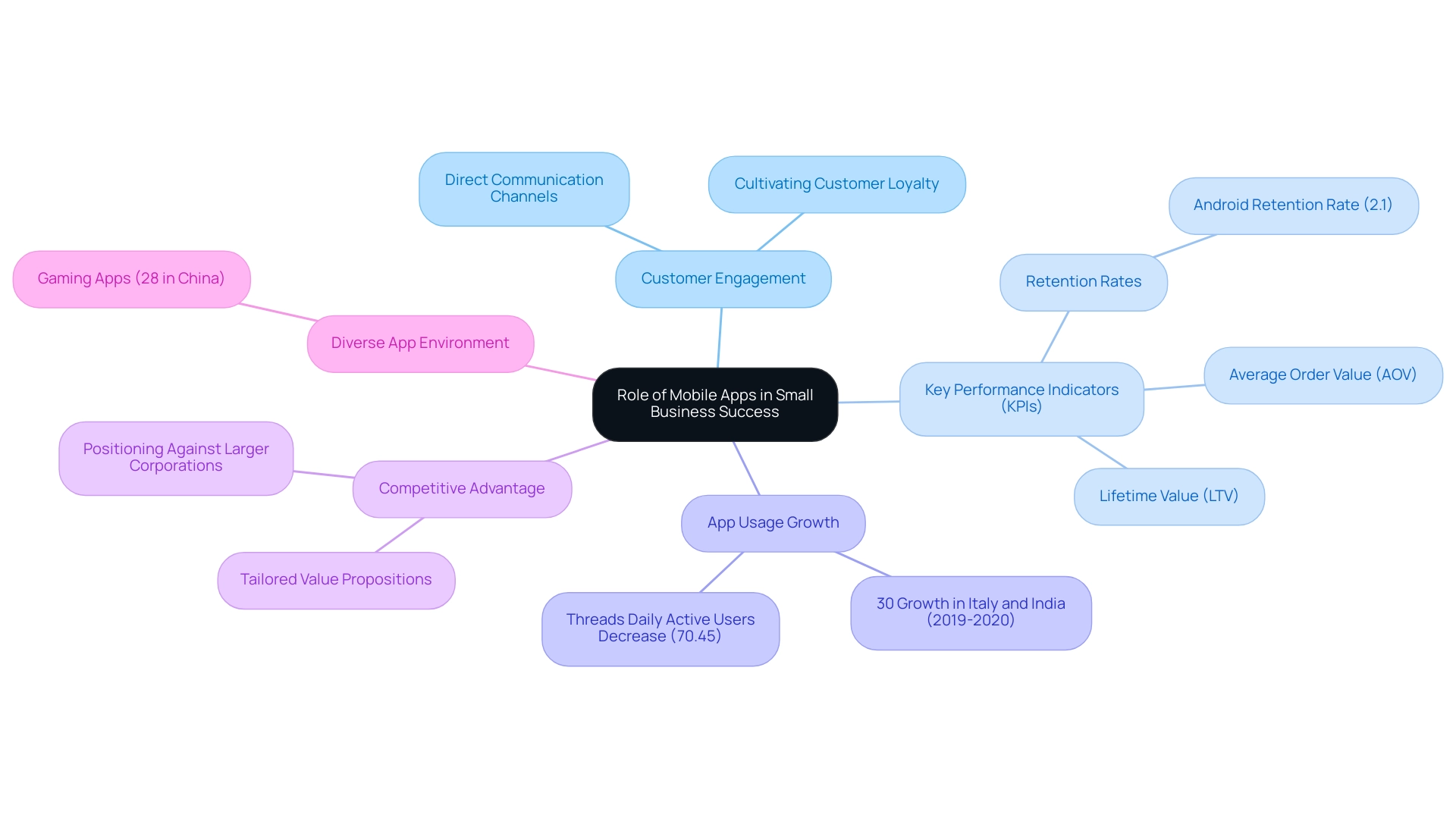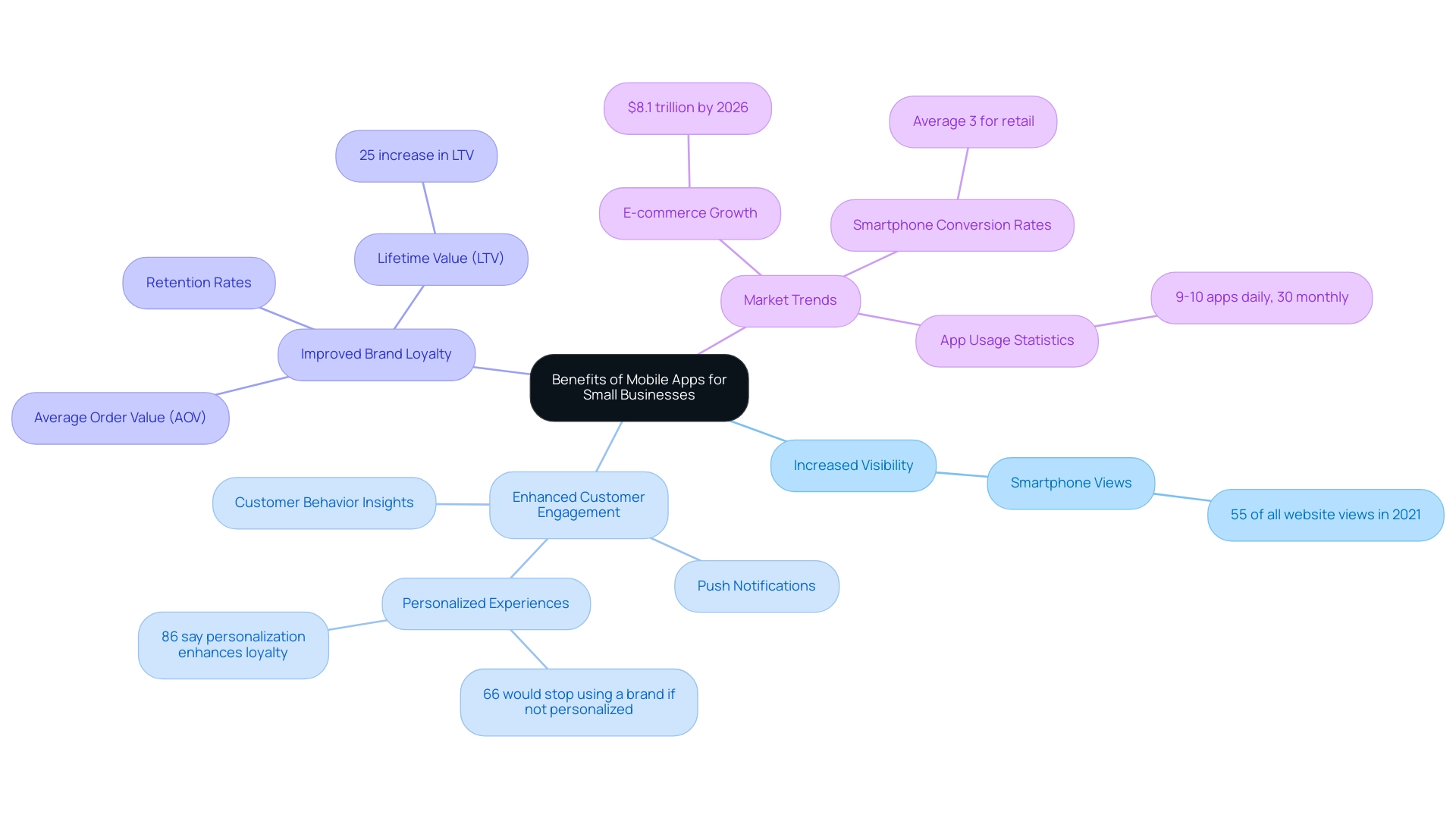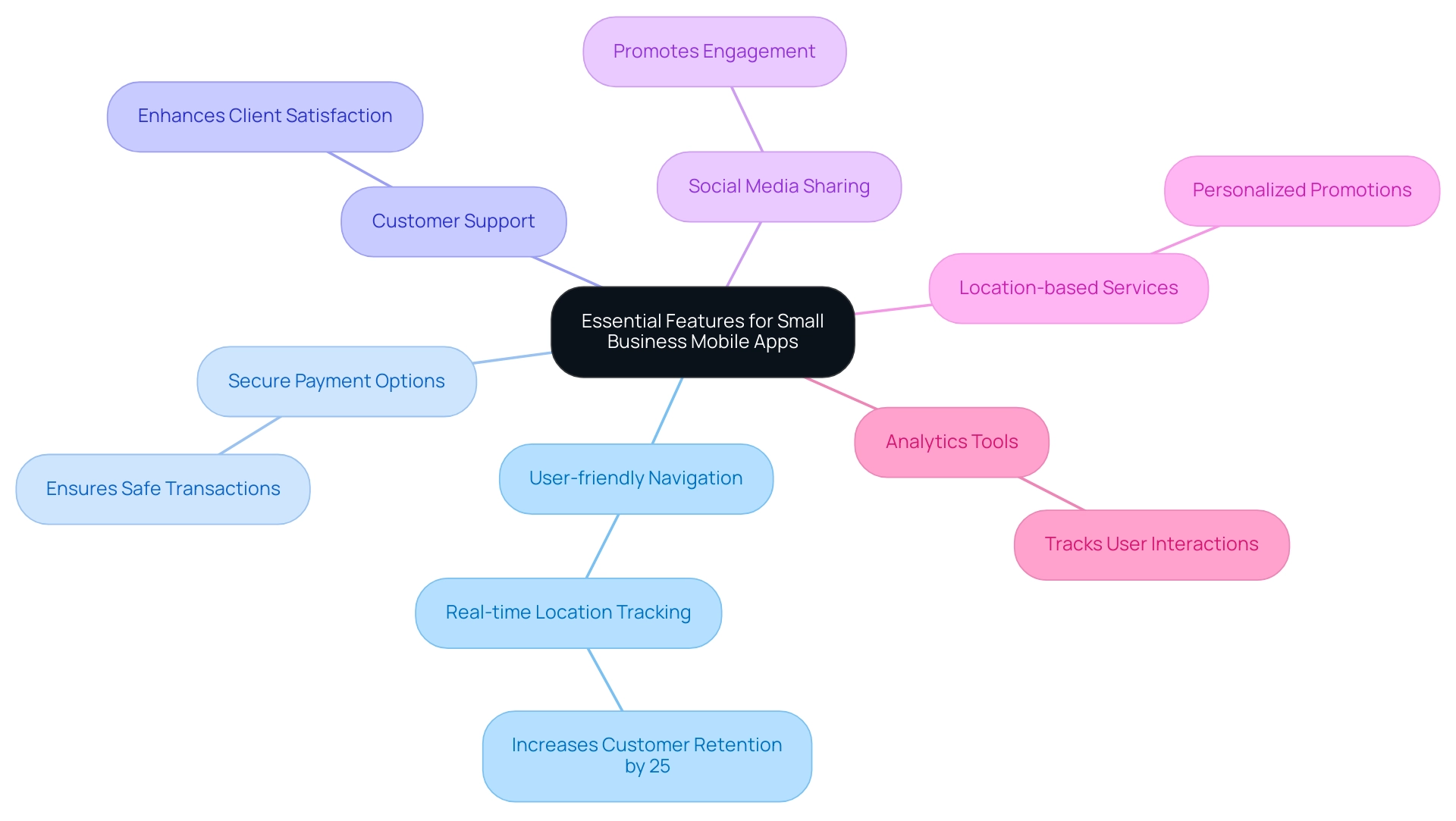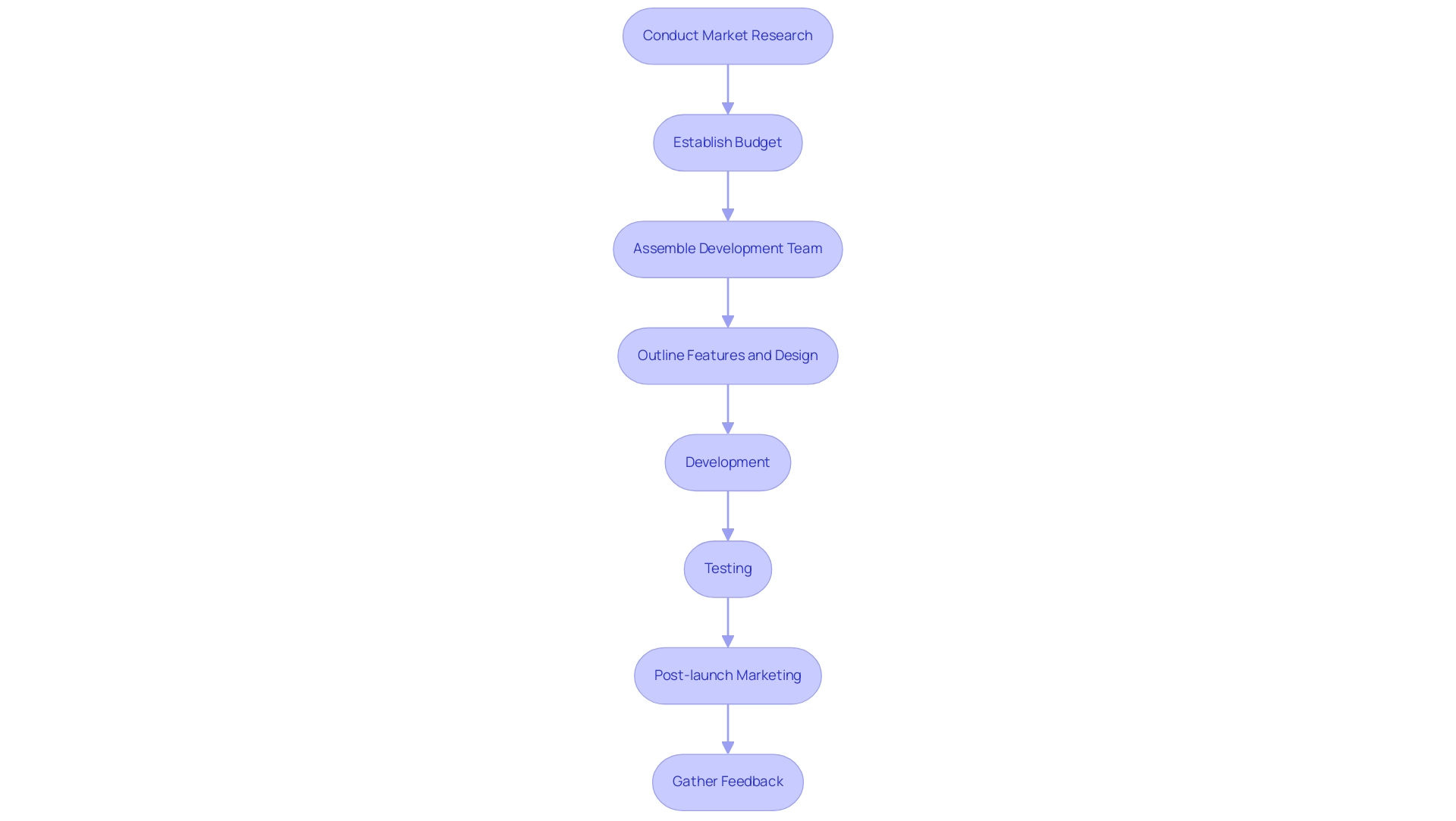Introduction
In the dynamic world of small business, mobile applications have emerged as game-changers, transforming how companies engage with their customers and streamline operations. As the digital landscape evolves, the significance of a dedicated mobile app cannot be overstated; it serves not only as a direct communication channel but also as a platform for enhancing customer loyalty and driving revenue growth.
With the mobile app market projected to soar, understanding the essential features, benefits, and strategic steps for effective app development is crucial for small businesses aiming to thrive in a competitive environment. This article delves into the multifaceted role of mobile apps in small business success, offering insights and actionable strategies to harness their full potential.
The Role of Mobile Apps in Small Business Success
Mobile apps for small businesses have become indispensable assets, serving as vital tools for direct customer engagement and superior service delivery. Our tailored e-commerce solutions, honed over 20 years of global experience, significantly enhance critical KPIs such as:
- Retention rates
- Average Order Value (AOV)
- Lifetime Value (LTV)
The shift towards a mobile-centric environment is illustrated by a notable increase in app usage, with Italy and India reporting a 30% growth in the average time spent on apps between 2019 and 2020.
A dedicated application not only streamlines operations but also delivers a personalized experience that elevates customer satisfaction and retention—key factors for building community value. As mobile apps for small businesses serve as direct communication channels, they enable small businesses to cultivate loyalty among their customers, thereby contributing to incremental revenue growth. Furthermore, they place small enterprises on a competitive footing with larger corporations by delivering tailored value propositions that resonate with their target audience.
This strategic approach is essential, particularly as the Android app retention rate encountered difficulties, with only 2.1% of individuals remaining after 30 days in Q3 2023. Interestingly, despite the overall growth in app usage, Threads experienced a significant decrease in daily active users by 70.45% in July 2023, highlighting the variability in user engagement trends. Furthermore, as per Statista, gaming applications represent 28% of the apps available in China, highlighting the diverse environment of applications.
By leveraging mobile apps for small businesses effectively, small enterprises across various sectors, including content publishing and charities, can drive growth, enhance KPIs, and foster stronger customer loyalty in an increasingly competitive landscape.

Key Benefits of Mobile Apps for Small Businesses
Mobile apps for small businesses are instrumental in driving growth, delivering a host of benefits that include increased visibility, enhanced customer engagement, and improved brand loyalty. Our customized e-commerce solutions, supported by more than 20 years of worldwide experience, significantly improve essential KPIs, including:
- Retention rates
- Average Order Value (AOV)
- Lifetime Value (LTV)
These solutions assist organizations in connecting with their communities. They enable businesses to connect with customers directly via push notifications, keeping them informed about promotions and updates in real-time.
For instance, one of our clients experienced a 25% increase in LTV after implementing our application, which streamlined their customer engagement strategies. The effect is considerable: smartphones represented 55% of all website views in 2021, according to Techjury, emphasizing the importance of technology in driving online engagement. Furthermore, the average smartphone user employs 9-10 applications daily and 30 applications monthly, demonstrating the significance of apps in daily consumer behavior.
With the e-commerce market expected to hit $8.1 trillion by 2026, utilizing technology is more essential than ever. Businesses that utilize mobile apps for small businesses typically experience higher conversion rates, with retail smartphone conversion rates averaging around 3%. This is largely because individuals appreciate the convenience of engaging with brands at their fingertips.
A compelling 66% of consumers indicated in 2023 that they would cease using a brand if their experience wasn't personalized, and 86% stated that personalized experiences enhance their loyalty, emphasizing the critical role of tailored interactions in fostering customer loyalty. Additionally, our solutions provide valuable analytics, enabling organizations to gain insights into customer behavior and preferences, thus enhancing engagement strategies and retention rates while generating incremental revenue.

Essential Features for Small Business Mobile Apps
In the competitive landscape of mobile app development, small businesses must prioritize essential features in their mobile apps for small businesses to enhance client experience and foster growth. Key functionalities include:
- User-friendly navigation, which is crucial in retaining customers; an app with a real-time location tracking feature can boost customer retention by 25%. This statistic emphasizes the importance of location-based services in maintaining customer loyalty.
- Secure payment options are also vital, ensuring that individuals feel safe when making transactions.
- Integrating customer support functionalities can significantly enhance client satisfaction.
- Social media sharing features further enhance visibility and promote engagement, making it easier for businesses to connect with their audience.
Additionally, utilizing the fact that consumers appreciate ads that save them money can improve marketing strategies within the app, generating extra value for individuals. Location-based services can provide personalized promotions to individuals based on their proximity, creating a tailored experience that resonates with them. Implementing analytics tools is essential for tracking user interactions and app performance, enabling informed decisions for future updates.
Significantly, Apple has compensated over USD 260 billion to iOS app creators as of January 2022, emphasizing the considerable financial opportunities that mobile apps for small businesses offer. The recent surge in Black Friday ecommerce sales, which grew nearly 15%, underscores the necessity for small enterprises to focus on effective digital strategies. By incorporating these features, companies can significantly enhance the user experience and drive their success in the constantly changing application landscape.

Steps to Successfully Develop a Mobile App for Your Business
Creating mobile apps for small businesses is a multifaceted process that requires careful planning and execution. The first and foremost step is to conduct in-depth market research, vital for understanding your target audience and their specific needs. This research lays the foundation for the subsequent steps and helps in defining your app's unique value proposition.
With the e-commerce market poised to reach an impressive $8.1 trillion by 2026, the relevance of mobile apps for small businesses is more pronounced than ever. As noted by MobiLoud, "In 2021 alone, 2 million new applications were created," underscoring the competitive nature of the app landscape. Tailored e-commerce solutions, backed by 20 years of global experience, can greatly enhance your app’s performance by generating community value and driving incremental revenue for your organization.
Our services encompass AI-driven coupons and white-label extensions that can be integrated into your app to enhance engagement and revenue generation.
Once your research is complete, the next critical component is establishing a well-defined budget. This budget should encompass not just the development costs but also marketing and ongoing maintenance expenses, ensuring that your investment is sustainable in the long run. Assembling a skilled development team—whether sourced in-house or through outsourcing—plays a crucial role in bringing your app concept to fruition.
It’s essential to outline your app's features and design clearly, as this will guide the development process.
During development, rigorous testing is imperative to ensure functionality and experience. Post-launch, an effective marketing strategy is essential to promote your app and draw in customers. Gathering feedback during this phase allows for iterative improvements, enhancing the app's effectiveness and user satisfaction.
Additionally, integrating advanced technologies such as blockchain can enhance security and transparency, particularly in transaction-heavy applications. Our tailored solutions address these complexities, ensuring a smooth integration process. However, organizations must navigate integration complexities and public perception challenges, which can pose significant hurdles.
By following these structured steps and leveraging tailored e-commerce solutions, small businesses can not only create mobile apps for small businesses successfully but also significantly enhance their operational efficiency and customer engagement. As Francois Duprat, Head of Product at Rakuten France, states, "The Besttoolbars team is very professional and very responsive to all the questions/developments to be prioritized. The deliverables are always of very good quality with almost no bugs."
This level of support can be invaluable in your app development journey.

Conclusion
Mobile applications are no longer just an option for small businesses; they are essential tools that drive engagement, enhance customer loyalty, and ultimately contribute to revenue growth. Throughout the article, it has been emphasized that a well-developed mobile app can serve as a direct communication channel, facilitating real-time interactions that resonate with customers. The data highlights the significant impact that mobile apps have on key performance indicators, such as retention rates and lifetime value, showcasing their importance in a competitive landscape.
The benefits of mobile apps extend beyond just customer engagement; they also provide valuable insights through analytics, enabling businesses to tailor their strategies according to user preferences. Essential features include:
- User-friendly navigation
- Secure payment options
- Personalized promotions
These features are critical for creating an enriching user experience that keeps customers coming back. Furthermore, the strategic steps outlined for successful app development underscore the importance of:
- Thorough market research
- Budgeting
- Effective marketing
These steps are vital to ensure long-term success.
In conclusion, as the mobile app market continues to grow, small businesses must seize the opportunity to harness this technology effectively. By prioritizing mobile app development and focusing on essential features and strategies, businesses can not only enhance their operational efficiency but also solidify their position in an increasingly digital world. Embracing mobile applications is not just a trend; it is a strategic imperative for small businesses aiming to thrive in today’s competitive environment.





